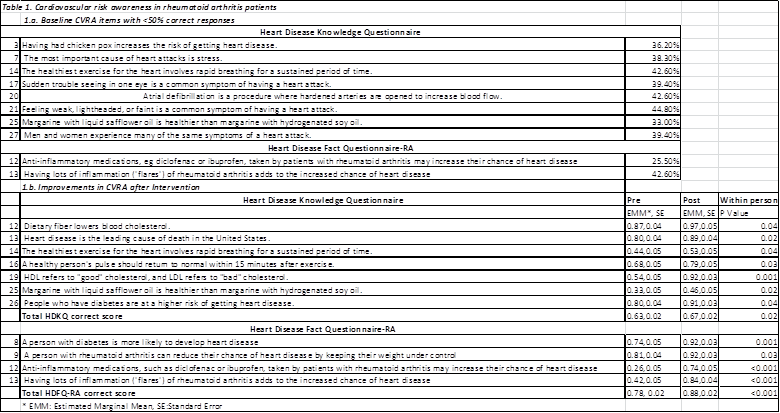Session Information
Session Type: ACR Poster Session B
Session Time: 9:00AM-11:00AM
Background/Purpose: The major cause of mortality in patients with Rheumatoid Arthritis (RA) is cardiovascular disease (CVD). However traditionally, very few RA patients receive screening and treatment for modifiable CVD risk factors; rates as low as 27-45%. The primary objective was to (a) evaluate baseline cardiovascular risk awareness (CVRA) in patients with RA and to (b) compare CVRA among RA patients before, and immediately after, a web-based educational intervention (EI).
Methods: Consecutive patients at two academic centers with a diagnosis of RA of at least 3 monthsÕ duration were enrolled. Patients completed questionnaires on demographics, RA and CVRA. CVRA was measured using the Heart Disease Knowledge Questionnaire (HDKQ; 30 items), and the Heart Disease Fact Questionnaire- RA (HDFQ-RA; 13 items); and were administered at baseline and immediately after EI. The EI consisted of a 28-minute educational video developed specifically to address CVRA in the context of RA. Experts in CVD prevention, educational intervention and RA were involved in developing the EI. The video also included RA patientsÕ testimonials to normalize health behavior change and provide motivation. This short video focused primarily on CVD issues pertinent to RA patients. These included exercise in the context of RA, the control of RA, and medications. The EI and the questionnaires were pilot tested on set of RA patients. General linear model analyses for repeated measures were used to compare within person changes in CVRA. Effect size (ES) were calculated for observed improvements in CVRA.
Results: 86 RA patients participated. The average age was 55.2±14.3 years (mean ± SD); 90% were women. Self-reported CVD risks were: post-menopause (69%), smoking (20%), hypertension (41%), diabetes mellitus (DM; 28%), sedentary lifestyle (61%), poorly controlled RA (47%) and current steroid use (55%). Ninety-five percent were taking medications for RA; most commonly methotrexate (61%) and biologics (68%). Less than half of the participants correctly answered 8/30 HDKQ and 2/13 HDFA-RA listed in Table 1. Average total scores for correct responses for HDKQ and HDFQ-RA at baseline were 63% and 78%; which improved to 67% (p=0.02, ES 0.25) and 89% (p <0.001, ES=0.71) respectively after EI. Improvements in CVRA after EI on specific questions of HDKQ and KDFA-RA are shown in Table 1. The largest improvements were noted for RA specific CVRA items.
Conclusion: General understanding of CVRA is poor among RA patients, specifically RA-specific CVD risks. However, a simple and short educational intervention resulted in large improvement in CVRA, specific to their RA. This EI may serve as a cost effective intervention that could potentially increase screening for CVD risks and behavior changes in RA. Further studies are ongoing to evaluate if the knowledge gains are retained over time and if they result in changes in health behaviors.
To cite this abstract in AMA style:
Jolly M, Kugasia A, Cordova C, Fair J, Steinig E, Kazkauskaite R, Walt L, Sengupta M, Block JA. Web Based Educational Intervention to Improve Cardiovascular Disease Knowledge Among RA Patients [abstract]. Arthritis Rheumatol. 2017; 69 (suppl 10). https://acrabstracts.org/abstract/web-based-educational-intervention-to-improve-cardiovascular-disease-knowledge-among-ra-patients/. Accessed .« Back to 2017 ACR/ARHP Annual Meeting
ACR Meeting Abstracts - https://acrabstracts.org/abstract/web-based-educational-intervention-to-improve-cardiovascular-disease-knowledge-among-ra-patients/

